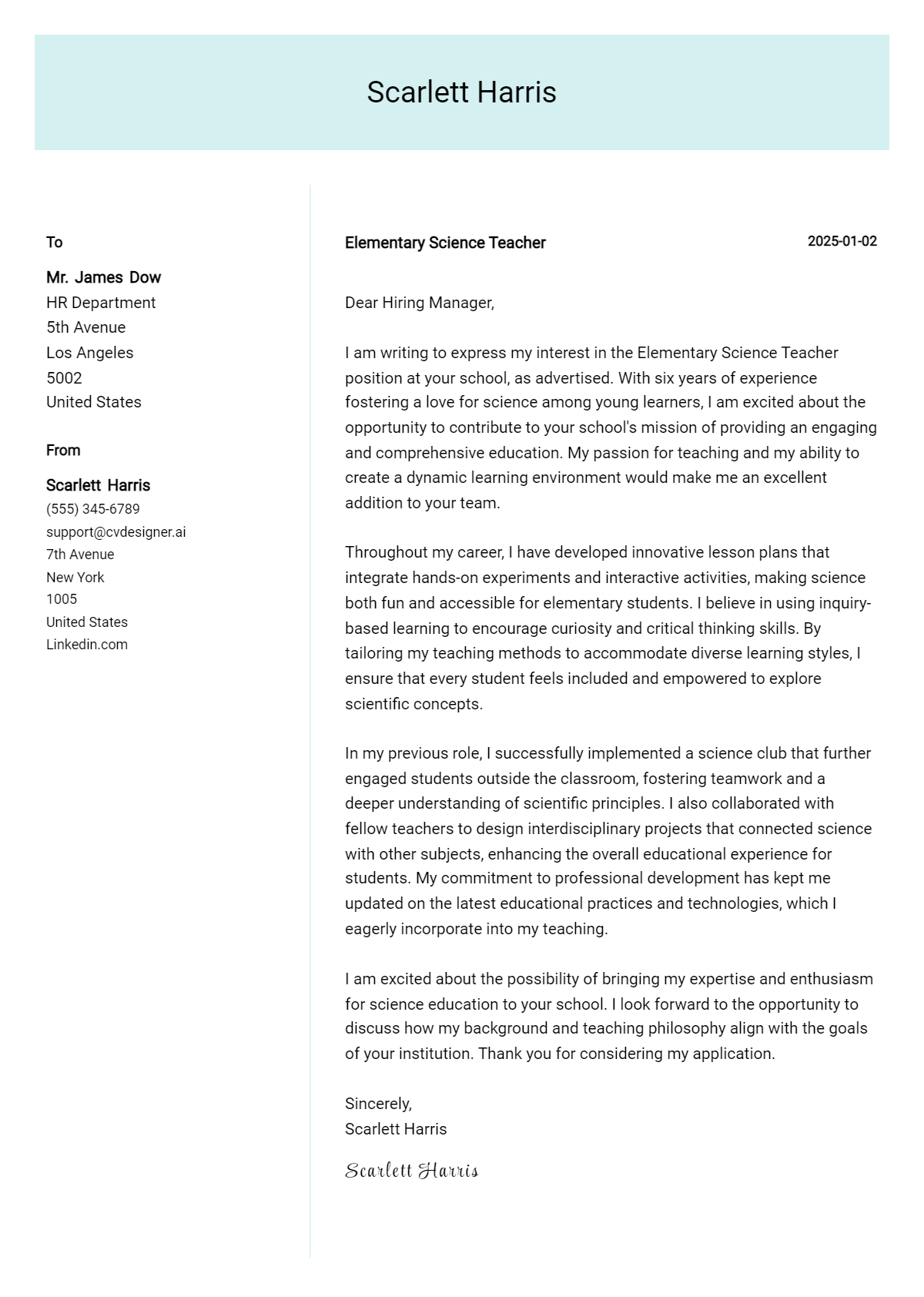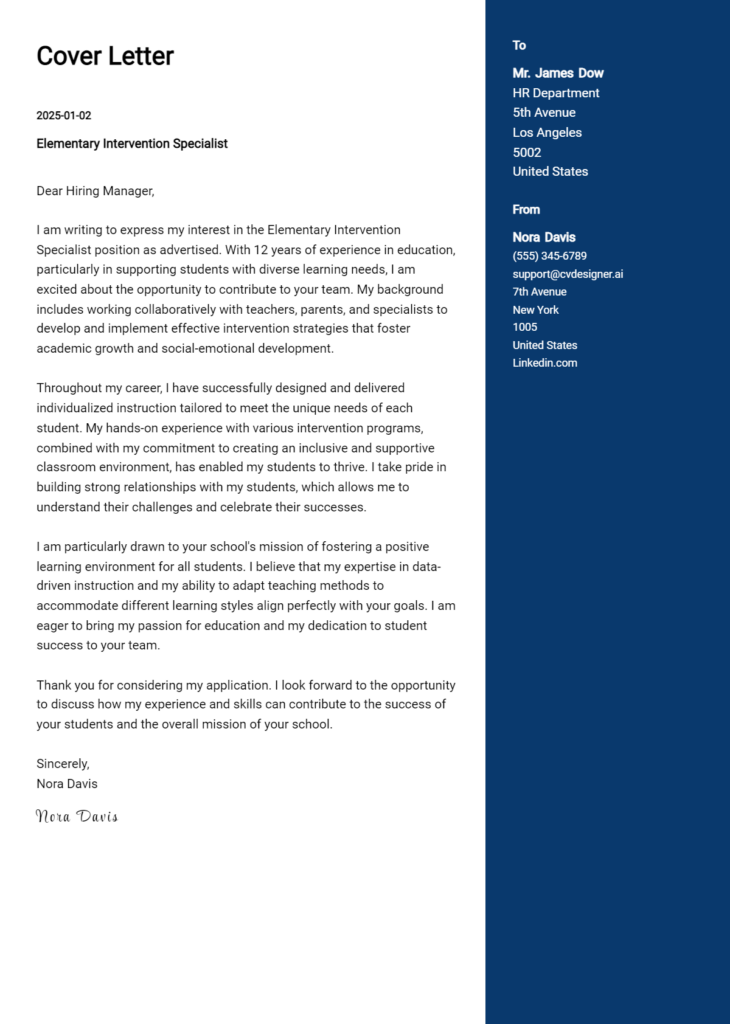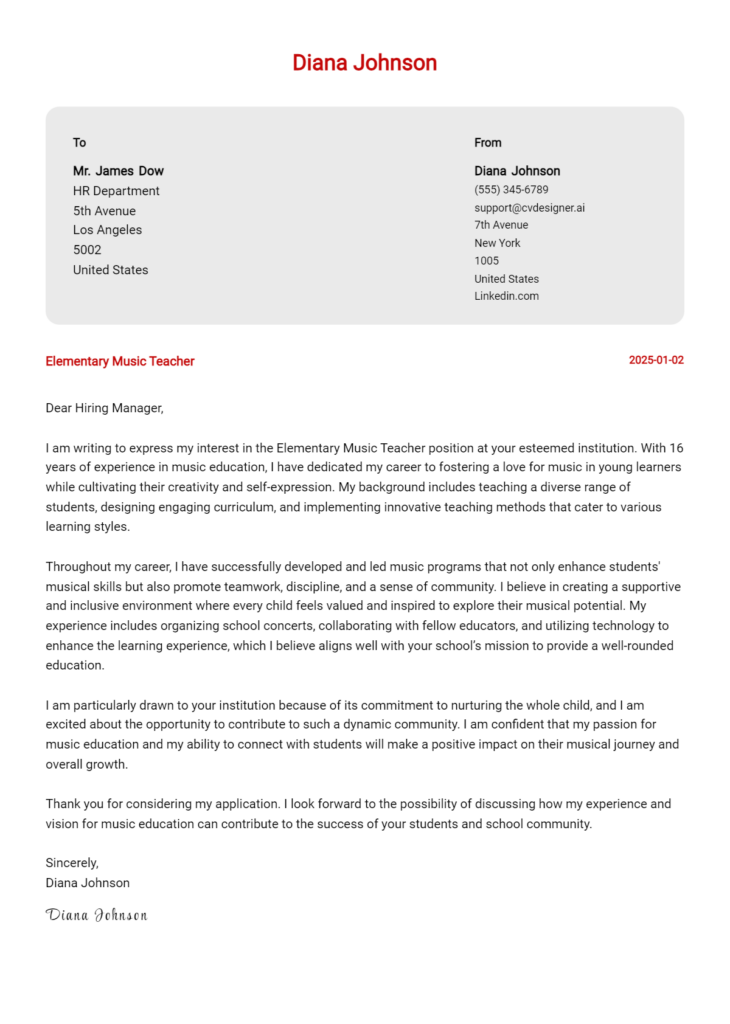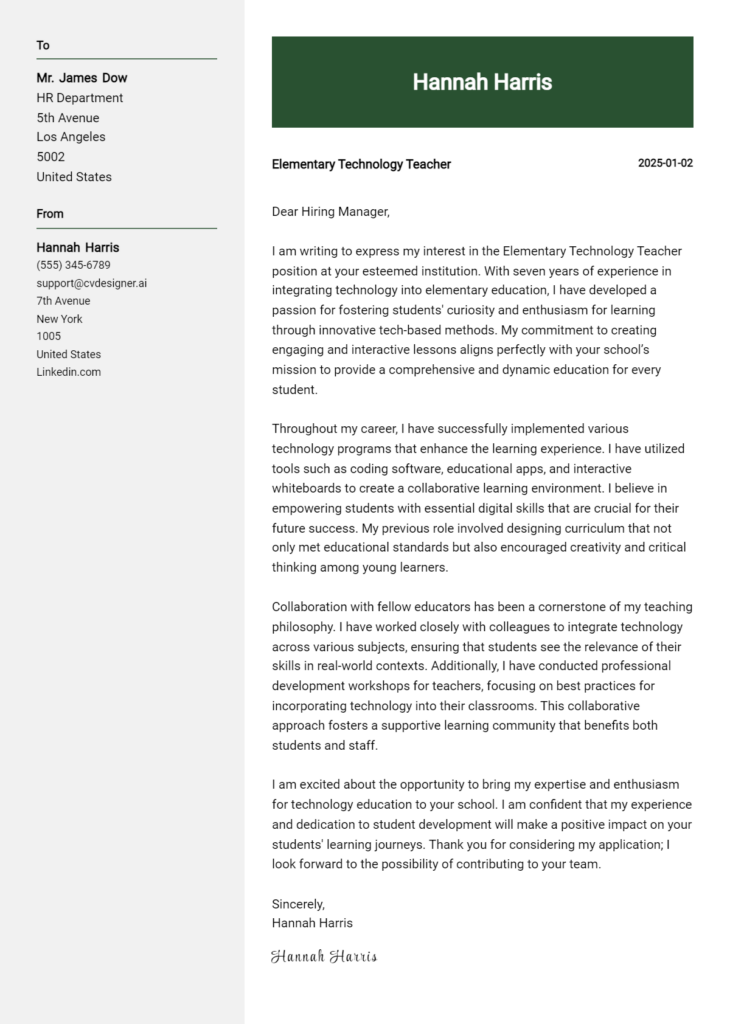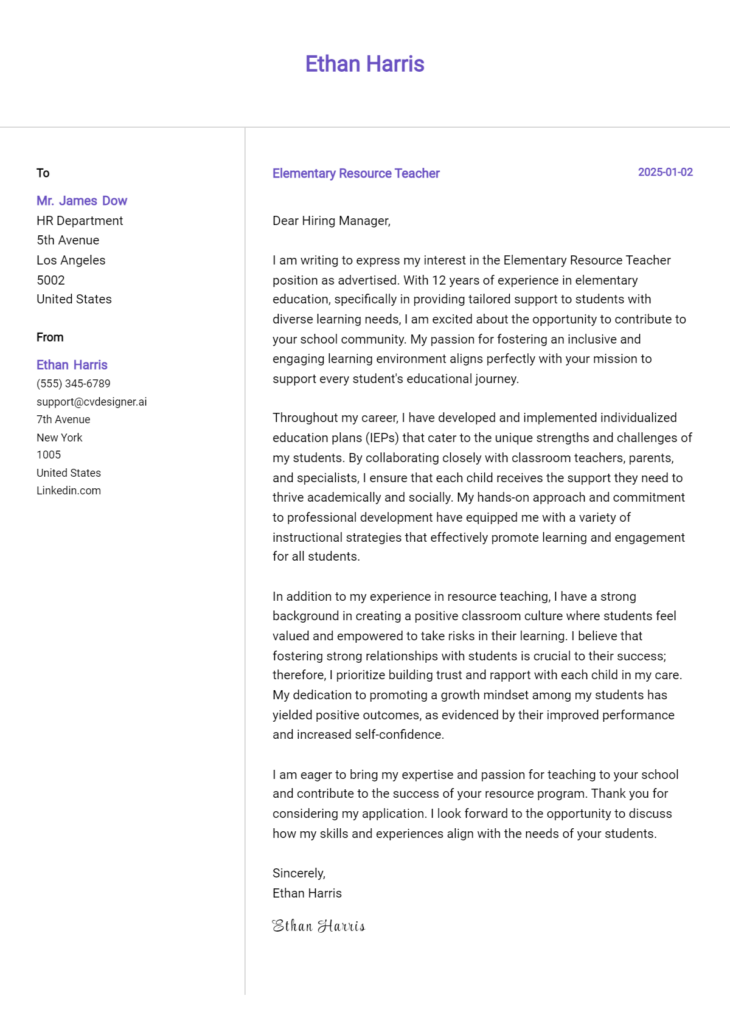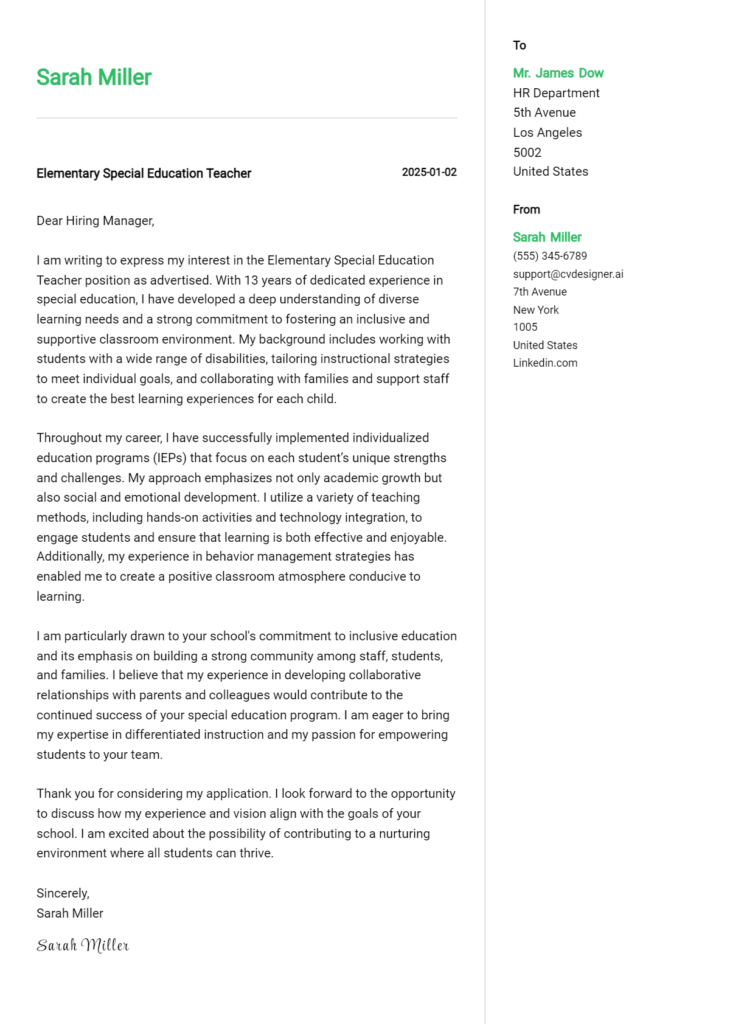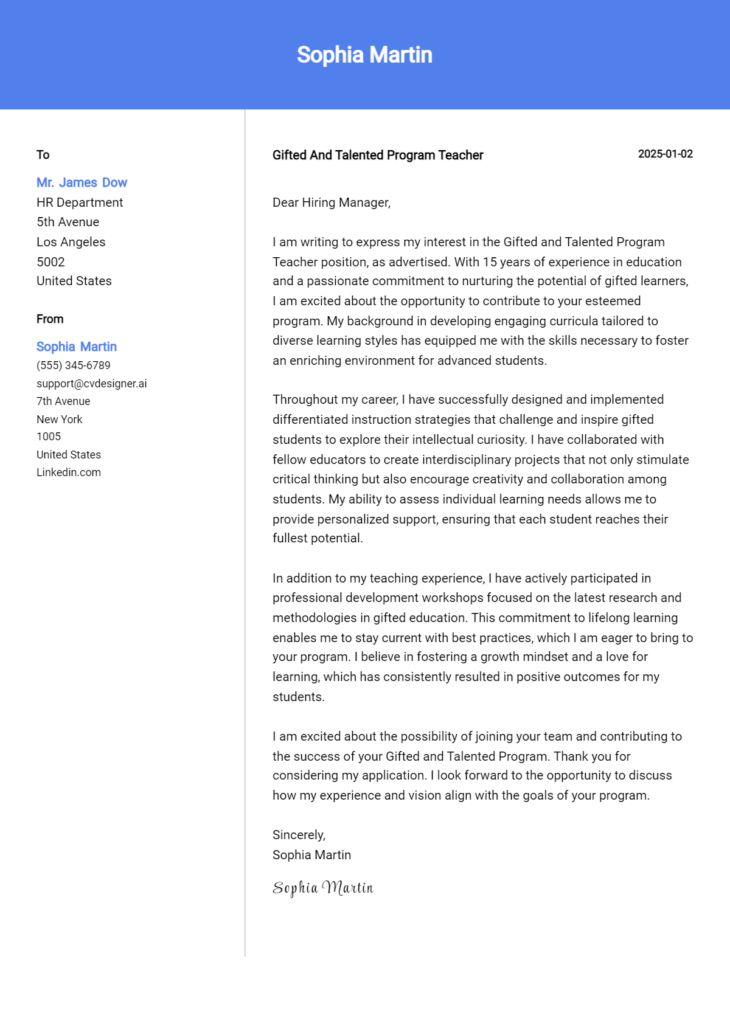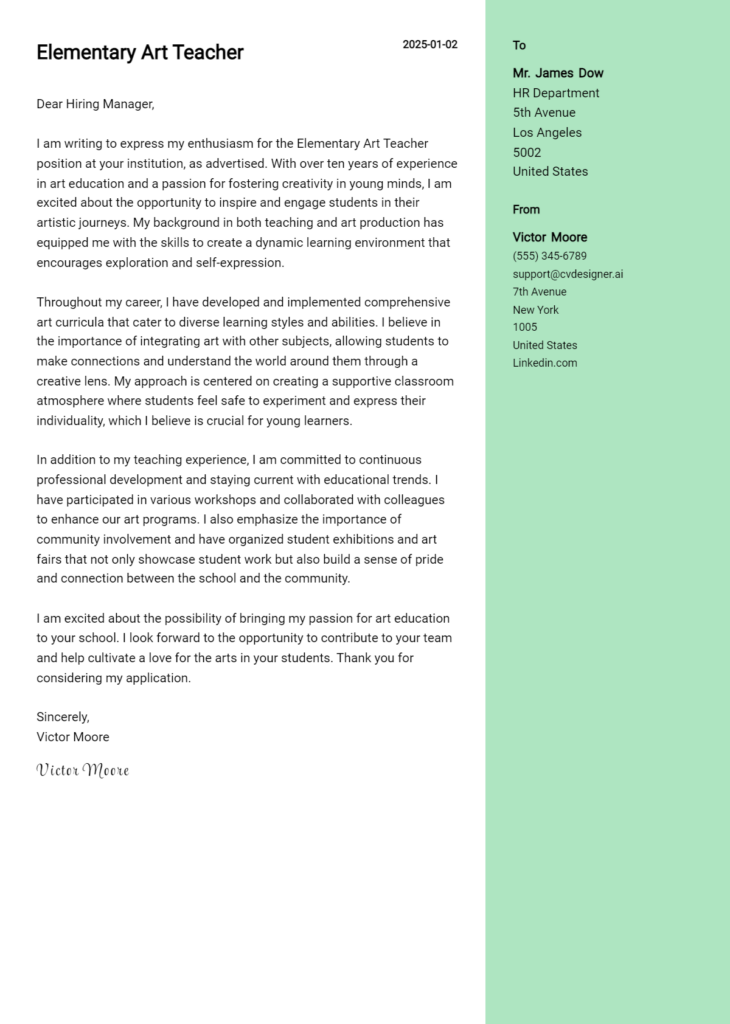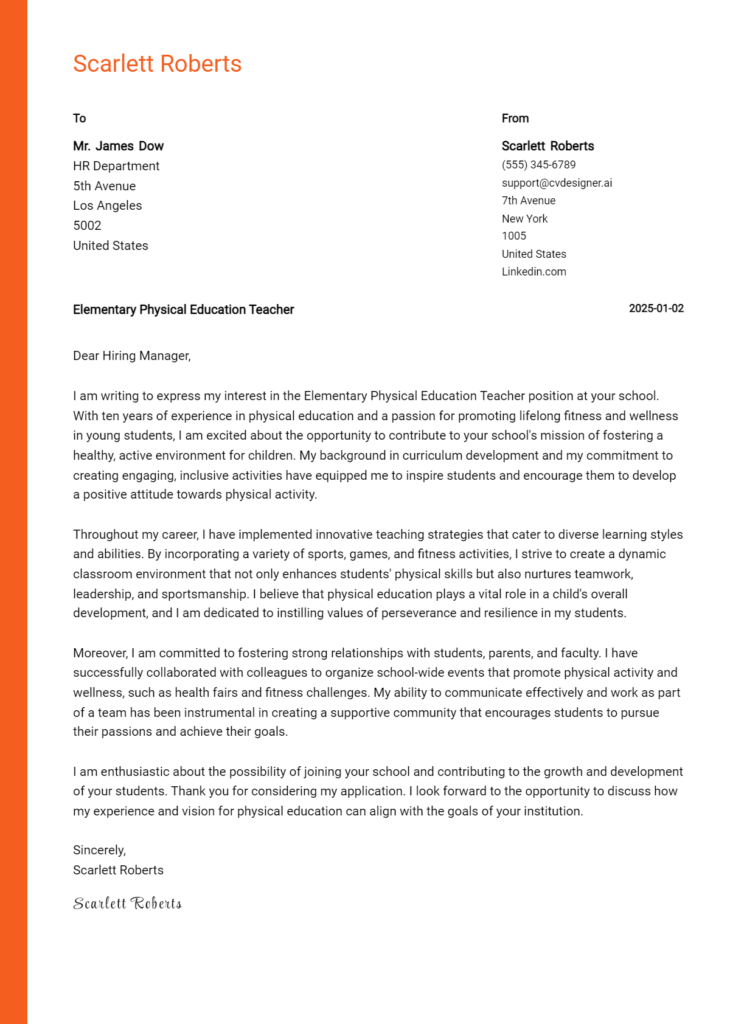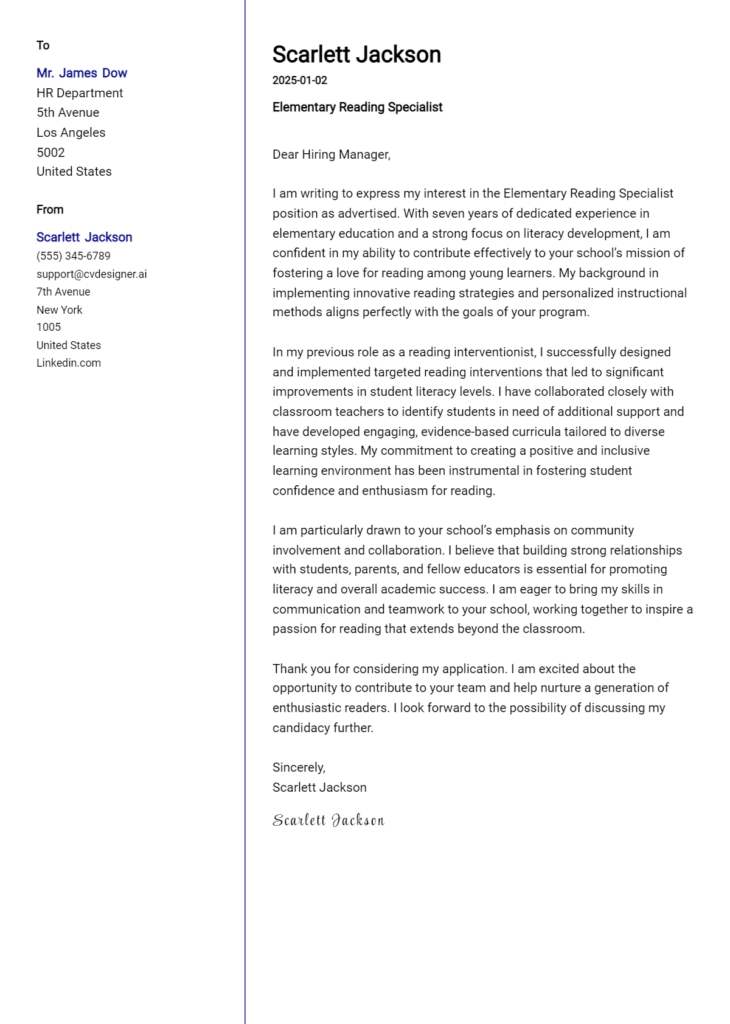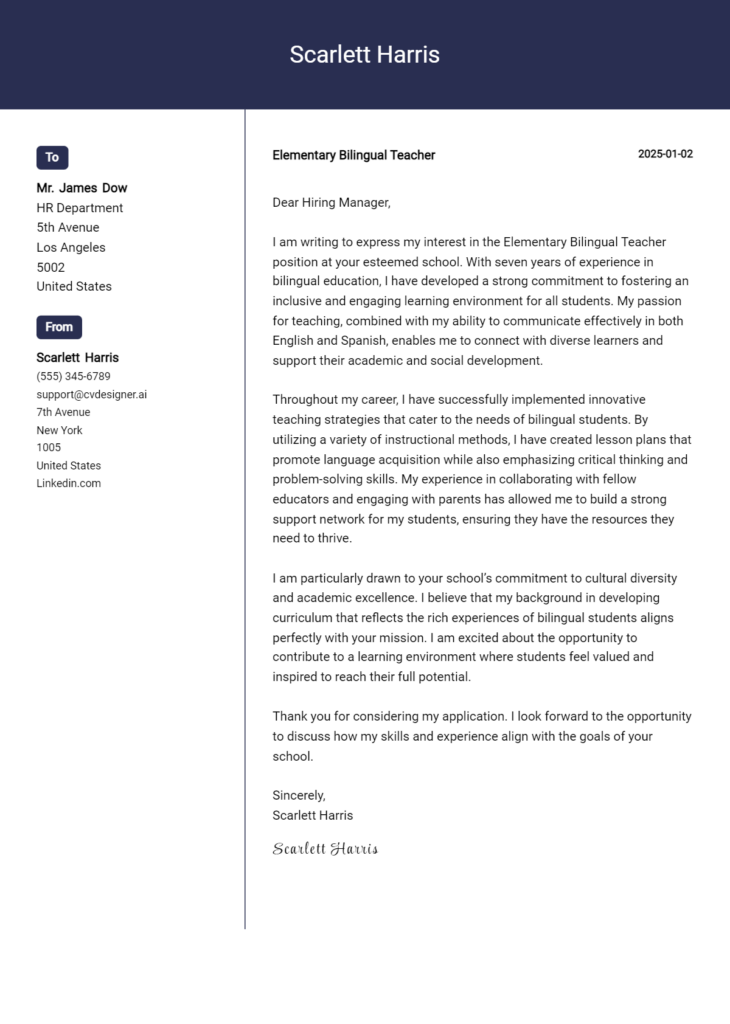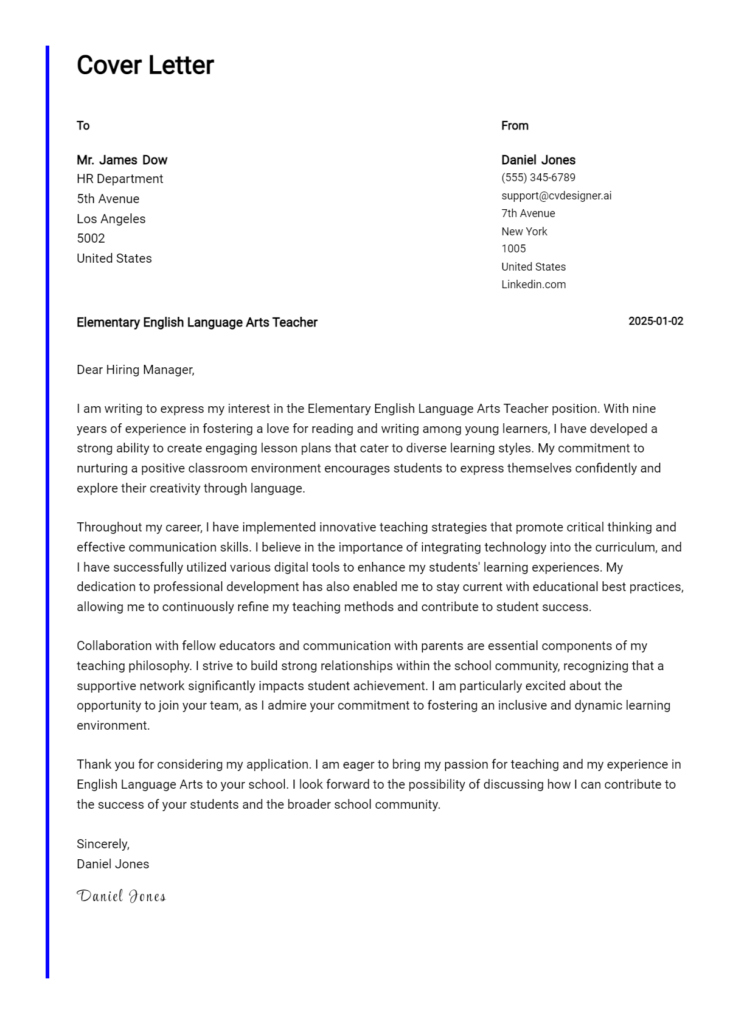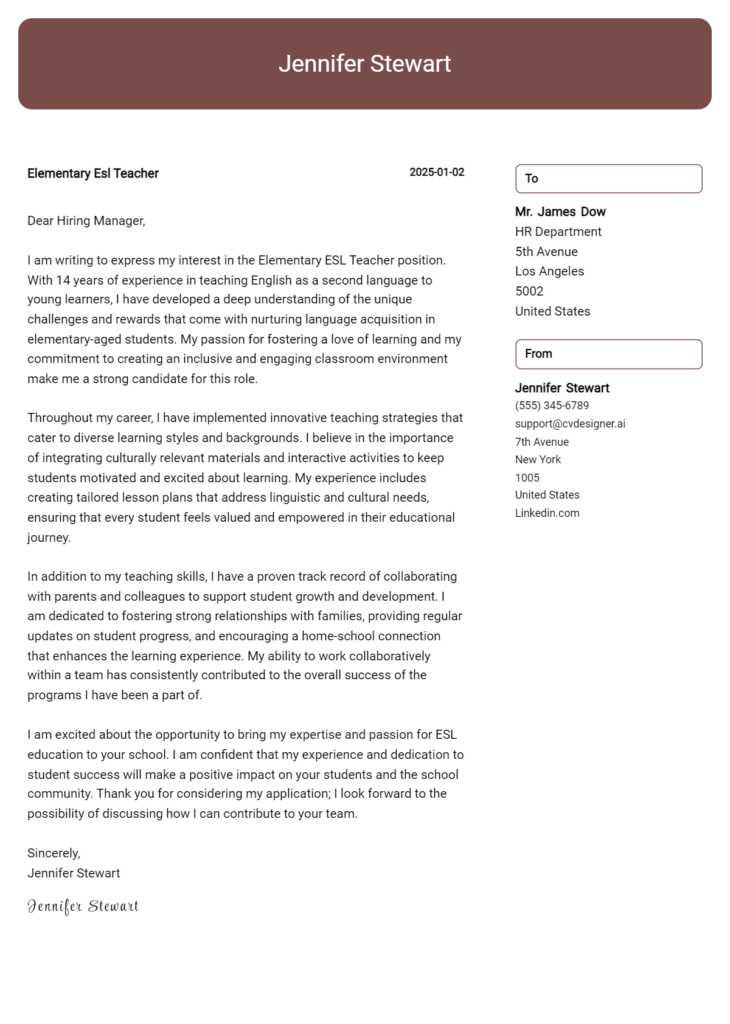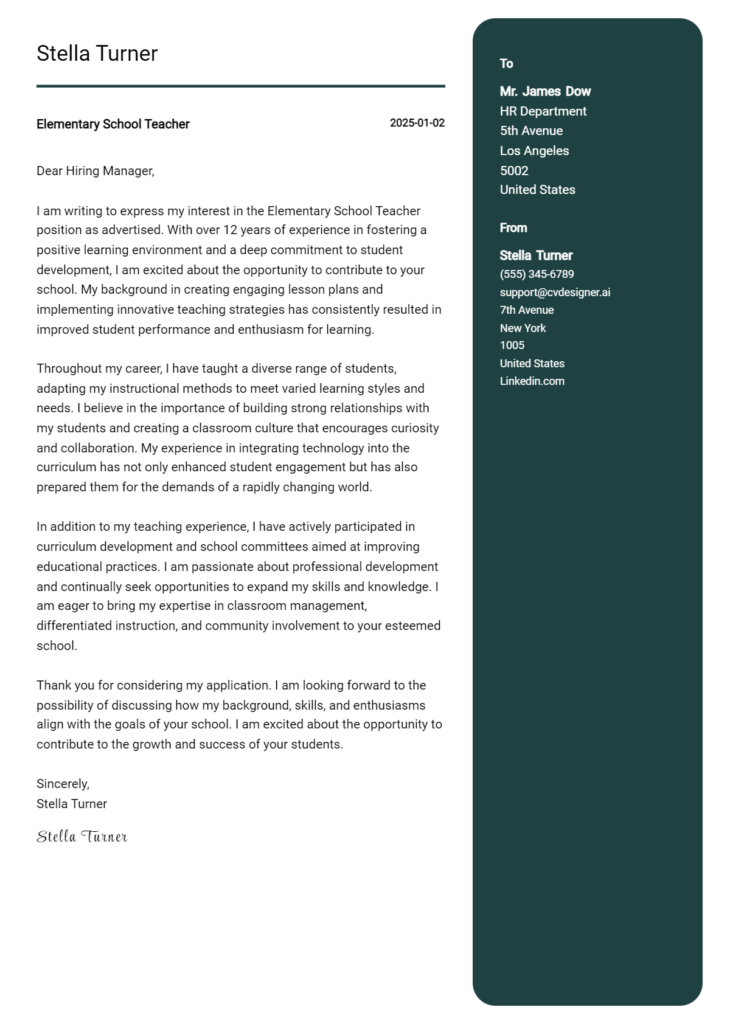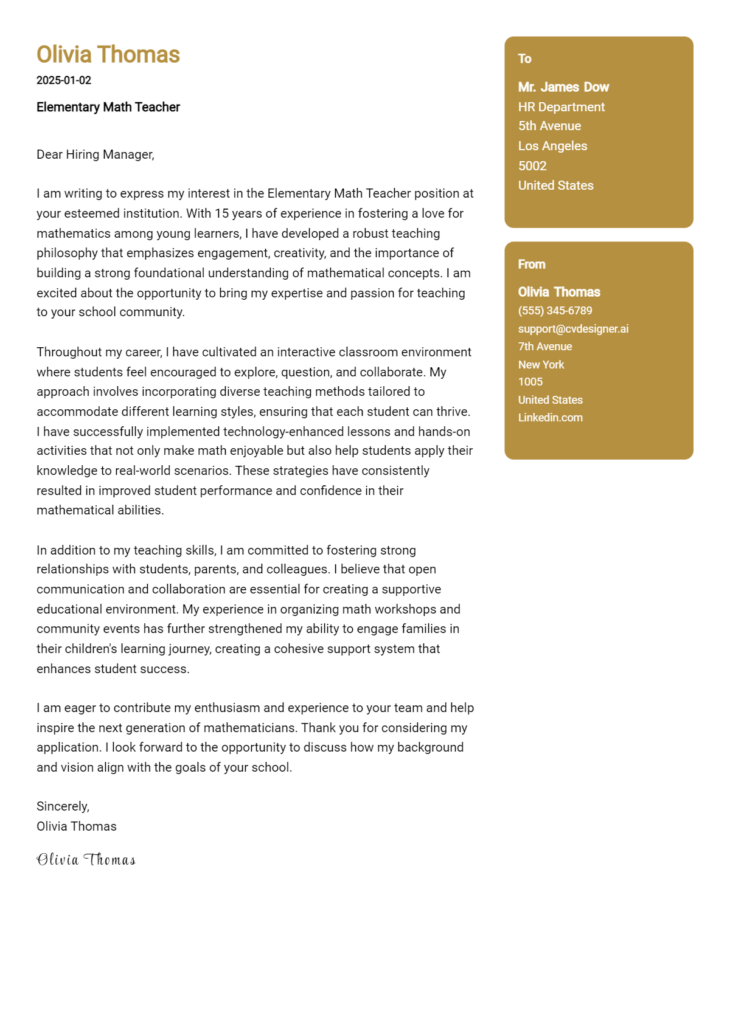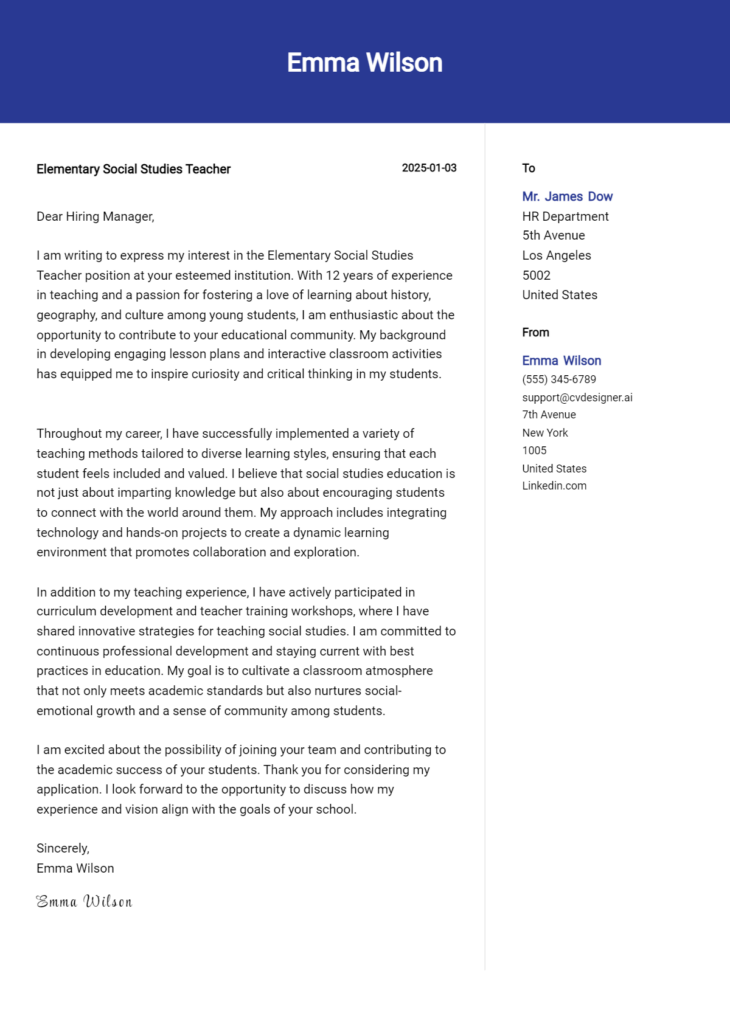Elementary Science Teacher Cover Letter Examples
Explore additional Elementary Science Teacher cover letter samples and guides and see what works for your level of experience or role.
How to Format an Elementary Science Teacher Cover Letter
Crafting a compelling cover letter is essential for aspiring Elementary Science Teachers. The format of your cover letter plays a significant role in how your passion for education and expertise in science are perceived. A well-structured cover letter not only showcases your qualifications but also reflects your ability to communicate effectively and engage with students—critical skills in the teaching profession.
In this guide, we’ll outline how to format your cover letter to make a lasting impression on hiring managers, emphasizing the importance of each component.
We will cover the essential elements of a professional cover letter, including:
- Cover Letter Header
- Cover Letter Greeting
- Cover Letter Introduction
- Cover Letter Body
- Cover Letter Closing
Each section is crucial for presenting your qualifications and dedication to fostering a love of science in young learners. Let’s delve into each part to ensure your cover letter stands out in the competitive field of education.
Importance of the Cover Letter Header for an Elementary Science Teacher
The header of a cover letter is a crucial element, as it sets the tone for the entire document and provides essential information at a glance. For an Elementary Science Teacher position, clarity and professionalism in the header can make a significant difference in the impression you leave on hiring committees. It should include your contact information, the date, and the recipient's details, ensuring that the reader can easily identify who you are and how to reach you. A well-structured header not only reflects your attention to detail but also demonstrates your commitment to professionalism—qualities that are particularly valued in the educational field.
Strong Example
Jane Doe 123 Maple Lane Springfield, IL 62701 janedoe@email.com (555) 123-4567 October 5, 2023 Mr. John Smith Principal Springfield Elementary School 456 Oak Street Springfield, IL 62701
Weak Example
jane doe email: janedoe@email.com 10/5/23 principal springfield elementary
The Importance of a Personalized Cover Letter Greeting for an Elementary Science Teacher
The greeting in a cover letter serves as the first impression you make on a potential employer, setting the tone for the entire letter. A well-crafted greeting not only demonstrates professionalism but also personalizes your application by addressing the hiring manager directly. This personal touch can make a significant difference, especially in the competitive field of education. To avoid generic greetings, take the time to research the recipient's name, which shows your initiative and genuine interest in the position. A personalized greeting can help establish a connection and engage the reader right from the start.
Strong Greeting Example
Dear Ms. Johnson,
Weak Greeting Example
To Whom It May Concern,
The Importance of a Well-Crafted Cover Letter Introduction for an Elementary Science Teacher
A well-crafted cover letter introduction is crucial for an Elementary Science Teacher as it serves as the first impression and sets the tone for the rest of the application. This introduction should not only capture the hiring manager's attention but also express a genuine interest in the role and briefly highlight the candidate’s key skills or relevant achievements. A strong introduction can distinguish a candidate from others, showcasing their passion for teaching and their commitment to fostering a love for science in young learners. Below are examples of both an effective and ineffective introduction to illustrate this point.
Strong Example
Dear [Hiring Manager's Name], I am excited to express my interest in the Elementary Science Teacher position at [School Name], as advertised on [Job Board]. With over five years of experience fostering a dynamic and engaging learning environment, I have successfully integrated hands-on science projects that inspire curiosity and critical thinking among my students. My innovative teaching methods, combined with my dedication to promoting STEM education, have resulted in a 20% increase in student science proficiency scores in my previous classroom. I am eager to bring my passion for science and commitment to student success to your esteemed school.
Weak Example
To Whom It May Concern, I am applying for the Elementary Science Teacher job you have open. I have some experience teaching kids, but I'm not sure if I’m the best fit. I think science is okay, and I have done some basic experiments with my students. I hope to get an interview.
Purpose of the Cover Letter Body for an Elementary Science Teacher
The body of a cover letter for an Elementary Science Teacher serves to highlight the candidate's unique qualifications, relevant experiences, and the specific contributions they can make to the school or educational institution. This section should showcase the teacher's passion for science education, classroom management skills, and innovative teaching methods. By detailing specific projects, such as hands-on experiments or interdisciplinary activities that have successfully engaged students, the candidate can effectively demonstrate their capability and enthusiasm for fostering a positive learning environment. This tailored approach not only presents the teacher as a strong candidate but also aligns their skills with the values and goals of the educational institution.
Strong Example
Dear Hiring Committee, I am excited to apply for the Elementary Science Teacher position at Greenfield Academy. Throughout my five years of teaching experience, I have developed and implemented a successful hands-on science curriculum that increased student engagement by 40%, as evidenced by improved test scores and positive feedback from parents. One notable project was the "Young Inventors Fair," where my students designed and created simple machines, fostering creativity and critical thinking. This experience not only ignited their passion for science but also enhanced their collaborative skills. I am eager to bring this innovative approach to Greenfield Academy, where I believe I can contribute to a dynamic learning environment. Sincerely, [Your Name]
Weak Example
Dear Hiring Committee, I want to apply for the Elementary Science Teacher job at your school. I have taught science for a few years and have done some projects. I think I can help students learn better. I like science a lot and would enjoy teaching it to kids. I have experience in the classroom but I don't have any specific examples to share. I hope you consider my application. Best, [Your Name]
Importance of the Cover Letter Closing for an Elementary Science Teacher
The closing paragraph of a cover letter is crucial for leaving a lasting impression on the hiring committee. It should effectively summarize your qualifications, reiterate your enthusiasm for the position, and prompt the reader to take the next steps, such as reviewing your resume or scheduling an interview. A strong closing reinforces your fit for the role and your commitment to fostering a love for science in young learners. In contrast, a weak closing may fail to inspire confidence or convey genuine interest, potentially jeopardizing your chances for an interview.
Strong Example
Thank you for considering my application for the Elementary Science Teacher position at your school. With my background in elementary education and my passion for instilling scientific curiosity in young minds, I am excited about the opportunity to contribute to your team. I believe my hands-on approach to science education can make a meaningful impact in your classroom. I look forward to the possibility of discussing my qualifications further and hope to schedule an interview at your earliest convenience. Thank you for your time.
Weak Example
I hope you like my application for the teaching job. I think I could do okay if you decide to hire me. Please let me know if you want to look at my resume or something. Thanks.
Crafting an effective cover letter is a crucial step for candidates applying for the role of an Elementary Science Teacher. A well-written cover letter not only introduces you to potential employers but also highlights your unique qualifications and passion for teaching. In this competitive field, it is essential to showcase your technical skills, problem-solving abilities, understanding of the Science Development Life Cycle (SDLC), teamwork, and a commitment to continuous learning. Here are five detailed tips to help you create a compelling cover letter that stands out.
Tips for Writing an Effective Cover Letter for an Elementary Science Teacher
Showcase Technical Skills
Highlight your proficiency in using educational technology and tools that enhance the learning experience. Mention any specific software or platforms you are familiar with, such as interactive science simulations or educational apps. Providing examples of how you have successfully integrated these tools into your teaching can demonstrate your capability and innovation.Demonstrate Problem-Solving Abilities
Use your cover letter to illustrate your problem-solving skills through real-life examples. Discuss challenges you faced in the classroom and how you addressed them, such as adapting lesson plans for different learning styles or overcoming resource limitations. This not only shows your ability to think on your feet but also your dedication to student success.Highlight Your Understanding of SDLC
If relevant, discuss your knowledge of the Science Development Life Cycle (SDLC) in your teaching methodologies. Explain how you incorporate scientific inquiry and experimentation into your lessons, guiding students through the stages of hypothesis, experimentation, observation, and conclusion. This can demonstrate your ability to teach foundational scientific principles effectively.Emphasize Teamwork
Collaboration is key in an educational environment. Share experiences that illustrate your ability to work with colleagues, parents, and the community. Highlight any team projects or interdisciplinary lessons you developed, showcasing how you contribute to a positive and cooperative school culture.Express a Passion for Continuous Learning
Convey your enthusiasm for professional development and lifelong learning. Mention any workshops, courses, or certifications you have pursued to improve your teaching skills or stay updated with the latest educational trends. This not only reflects your commitment to personal growth but also your desire to provide the best education for your students.
By following these tips, you can create a strong cover letter that effectively communicates your qualifications and passion for teaching science to elementary students. For additional resources, consider exploring cover letter templates and using a cover letter builder to streamline the writing process.
Common Mistakes to Avoid in an Elementary Science Teacher Cover Letter
Crafting a compelling cover letter is essential for standing out as an Elementary Science Teacher, as it provides a first impression to potential employers. Avoiding common mistakes can significantly enhance your chances of success. Here are some pitfalls to steer clear of:
Generic Greetings: Using "To Whom It May Concern" indicates a lack of effort. Instead, find the hiring manager’s name for a more personalized touch.
Repeating Your Resume: Simply restating your resume can bore the reader. Focus on highlighting specific achievements and experiences that demonstrate your teaching philosophy and passion for science.
Lack of Specificity: Failing to tailor your cover letter to the school or district can make you seem uninterested. Research the institution and incorporate relevant details to show your enthusiasm.
Neglecting Formatting: A cluttered or poorly formatted cover letter can distract from your message. Use a clear layout, including proper spacing and professional fonts, to enhance readability. Refer to this cover letter format for guidance.
Overemphasizing Qualifications: While it's important to showcase your qualifications, avoid coming off as arrogant. Balance your achievements with a humble approach that conveys your eagerness to grow and contribute.
Ignoring the Closing Paragraph: A weak conclusion can leave a lackluster impression. End with a strong closing that reiterates your interest and invites further communication.
Spelling and Grammar Errors: Typos can undermine your professionalism. Always proofread your letter, or consider using tools or a second pair of eyes to catch any mistakes.
For examples of effective cover letters, consider visiting these cover letter examples to inspire your writing. By avoiding these common mistakes, you can create a compelling narrative that highlights your unique qualifications as an Elementary Science Teacher.
Cover Letter FAQs for Elementary Science Teacher
What should I include in my cover letter for an Elementary Science Teacher position?
When crafting your cover letter for an Elementary Science Teacher position, it's essential to include specific elements that highlight your qualifications and passion for teaching. Start with a strong introduction that states the position you are applying for and where you found the job listing. Discuss your relevant educational background, emphasizing any degrees in education or science. Highlight your teaching experience, particularly with elementary students, and incorporate examples of how you've engaged students in scientific inquiry. Additionally, mention any certifications or special training you have in science education. Conclude with a strong closing statement expressing your enthusiasm for the role and your desire to contribute to the school community.
How can I demonstrate my teaching philosophy in my cover letter?
To effectively convey your teaching philosophy in your cover letter, use specific examples that illustrate your approach to teaching science. Discuss how you foster a love for science in your students, perhaps by incorporating hands-on experiments or inquiry-based learning techniques. Explain your belief in the importance of making science accessible and relatable, using real-world applications to engage students. Consider sharing a brief anecdote about a successful lesson or project that exemplified your teaching style and its impact on student learning. This personal touch not only demonstrates your philosophy but also showcases your effectiveness as an educator, making your application more memorable.
Should I mention specific skills or tools relevant to teaching science?
Yes, mentioning specific skills or tools relevant to teaching science is crucial in your cover letter. Highlight your proficiency in using technology in the classroom, such as interactive whiteboards, educational software, or virtual labs that enhance science learning. Include any experience with curriculum development or lesson planning that incorporates STEM (Science, Technology, Engineering, and Mathematics) principles. Additionally, if you have experience with science-related assessments or utilizing hands-on materials and experiments, be sure to mention these as they directly relate to your effectiveness as a science teacher. Demonstrating your familiarity with contemporary teaching tools and methods will strengthen your candidacy.
How can I tailor my cover letter to a specific school or district?
To tailor your cover letter to a specific school or district, begin by researching the institution’s mission, values, and any unique programs they offer, particularly in science education. Mention these aspects in your cover letter to show your genuine interest in the school and how your teaching philosophy aligns with their educational goals. If the school has a focus on environmental science or STEM initiatives, for instance, emphasize your experience or passion for these areas. Additionally, if you can, reference any community involvement or partnerships the school has that resonate with your teaching style. This personalized approach demonstrates your commitment and makes your application stand out in a competitive field.
Build your Cover Letter in minutes
Use an AI-powered cover letter builder and have your letter done in 5 minutes. Just select your template and our software will guide you through the process.

